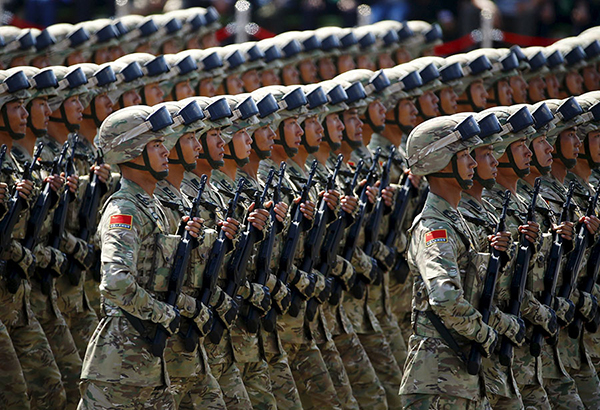 |
|
Soldiers of China's People's Liberation Army (PLA) march during the military parade marking the 70th anniversary of the end of World War Two, in Beijing, Sept 3, 2015. [Photo/Agencies] |
The military parade in Beijing on Sept 3 commemorating the 70th anniversary of the victory in the war against fascism provided a good opportunity to review whether the peace forged by blood is solid, and what are the risks and challenges on the way ahead.
History not only connects, but also defines the past and the future. As President Xi Jinping has said: "Only when everyone cherishes peace, defends peace and only when everyone remembers the painful lessons of war, is peace possible to attain." We recalled the horrors of the anti-fascist war on the 70th anniversary of its end to defend peace and human dignity.
The way people see history decides what kind of a world they will build, and what their future will be like. We will never forget the unflinching and unyielding fight of the Chinese people and army against the Japanese invaders. We will never forget that 35 million Chinese civilians and soldiers died or were wounded to attain national independence and restore peace.
The Chinese People's War of Resistance against Japanese Aggression (1937-45) is an indispensable part of the history of fighting for peace, and an integral part of the world's anti-fascist war. During the war, volunteers from the Soviet Union and the United States flew fighter jets to combat the Japanese Zeros in the skies over China. Soldiers from more than 20 countries, including the Soviet Union, the United Kingdom, Australia and Cambodia, fought shoulder-to-shoulder with the Chinese soldiers against their common enemy, the Japanese fascists, in China.
The Chinese expedition army, too, fought bravely with the Allied Forces in the rainforests of Southeast Asia.
The Sept 3 victory parade in Beijing reflected China's concerns over humankind's future. That President Xi said, "China will unswervingly walk the road of peaceful development, and hopes all countries can walk the road together with China, to let the sunshine of peace brighten the planet," manifests the Chinese people's perception of history and love for peace. Without the right perception of history in the region, the talk of "lasting peace" is hollow.
China's "Triumphal Arch" is located in Zhijiang, a small city in Central China's Hunan province where Japan surrendered to China in an official ceremony in 1945. The arch is made of four pillars with a lintel above, which makes it look like the Chinese character for "blood". It not only means death, but more importantly also signifies the Chinese people's courage and uprightness.
During the war, parents encouraged their sons and women their husbands to join the Chinese army despite knowing that their loved ones might not return once they left home to join the resistance. They firmly believed death on the road to national independence and freedom was more worthwhile than slavery for life. The victory we commemorate today was earned through the great sacrifices of such common people and their families.
Throughout the war, the Communist Party of China kept urging all powers to set aside their differences and unite against the common enemy of the nation, the Japanese forces. The Kuomintang party-led forces on the frontline of the war and the CPC-led forces behind the enemy lines were separated but collaborative.